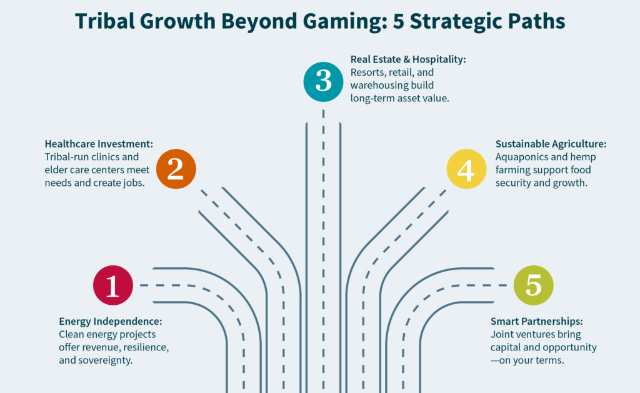Key Takeaways:
- Tribes can diversify beyond gaming by investing in sectors like healthcare, real estate, and renewable energy.
- Federal funding programs like the American Rescue Plan Act and the Infrastructure Investment and Jobs Act offer Tribal enterprises capital for broadband, infrastructure, and economic development.
- Strategic partnerships and sovereign tax advantages help attract private investment and foster long-term economic resilience.
—
If you help lead a Tribal enterprise, you already know the strength that comes with sovereignty. That legal and cultural independence gives you control few other governments or businesses have. And for many Tribes, gaming has been the foundation for economic success and community development.
But now, you're facing a new kind of challenge — and opportunity.
With market pressures, increased competition, and shifts in federal policy, Tribes across the country are asking the same question: What comes next? The good news is, you have options — and powerful tools at your disposal to build something bigger.
From Reliance to Resilience
Gaming is still a vital part of your economic engine, but overreliance on it comes with risks. Policy changes, consumer trends, and broader economic disruptions can quickly shift the landscape. Many Tribal nations are actively exploring ways to reduce that vulnerability by creating more balanced portfolios — diversifying not just revenue, but also job opportunities, services, and long-term community value.
This pivot isn't about abandoning gaming; it's about using its strength to fuel what comes next. Whether you're considering expansion into renewable energy, healthcare, or real estate, now is the time to act.
Using Federal Funds to Fuel New Growth
Over the last several years, federal legislation like the American Rescue Plan Act, CARES Act, and the Infrastructure Investment and Jobs Act have opened the door to unprecedented capital. These programs aren't just about short-term relief — they're about long-term investment.
For your enterprise, this funding can help fill critical infrastructure gaps: broadband, water systems, transportation, and housing. These are the foundational pieces that make economic expansion possible. But more than that, they can accelerate the launch of new ventures — if you have a clear strategy in place.
Where You Can Grow: High-Impact Sectors for Your Enterprise
As your Tribal enterprise looks beyond gaming, the question becomes not just why diversify but where to begin. The strongest opportunities are those that reflect your community's values and build on your strengths — your land, your people, and your sovereignty.
Across Indian Country, Tribes are turning vision into action by investing in sectors that not only generate revenue but also promote resilience and self-sufficiency.
Energy is one such area. Projects in solar, wind, and hydroelectric power are gaining momentum. These aren't just revenue generators — they are energy independence and environmental stewardship. With many federal grants aimed at clean energy transition, Tribal nations are well positioned to lead in this space while reinforcing sovereignty.
Real estate and hospitality are also seeing growth, especially where Tribal land is strategically found near tourism or transit corridors. Some Tribes are building hotels, resorts, or mixed-use developments; others are investing in warehousing and logistics to serve growing e-commerce and supply chain demands.
Healthcare and wellness initiatives are another promising path. From Tribal-run clinics to elder care and behavioral health centers, these ventures meet urgent needs while offering steady, often federally supported revenue streams. They're also creating career paths in health services for Tribal members.
Agriculture is evolving, too. Forward-thinking Tribes are embracing aquaponics, hemp cultivation, and other sustainable farming models that promote food security and align with traditional stewardship values. These ventures often integrate well with youth programs and education efforts, deepening community impact.
And, increasingly, strategic partnerships are unlocking new potential. Joint ventures with private-sector companies — when structured with care — can bring capital while protecting Tribal interests. These partnerships work best when you set the terms, using your sovereignty and tax advantages to create win-win outcomes.
These aren't theoretical ideas. They're real, working examples of how Tribal enterprises across the country are reclaiming control over their economic futures.

Preparing for What Comes Next
Of course, diversification doesn't happen overnight. It requires planning, ability building, and a willingness to grow from within. That may mean developing a stronger governance structure, modernizing financial systems, or building a local workforce that's trained for emerging industries.
You may also face external headwinds — regulatory uncertainty, rising interest rates, environmental risks — but a thoughtful, data-informed strategy helps you navigate those with confidence. Tribal enterprises that take the time to build that foundation now will be the ones best positioned for long-term success.
The Path Forward
The moment we're in is rare. Your enterprise has sovereign control, a supportive federal policy environment, and an economic base to build from. But most importantly, you have a mission — one that ties your business strategy to community well-being, self-determination, and generational prosperity.
The content of this article is intended to provide a general guide to the subject matter. Specialist advice should be sought about your specific circumstances.




